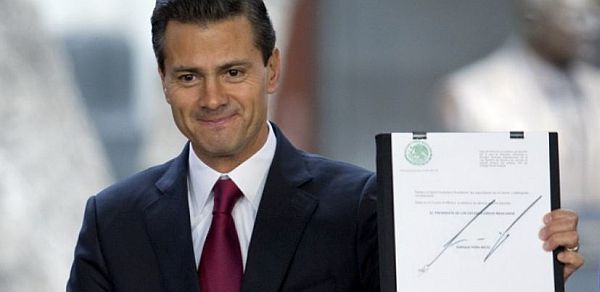Mexico City, Mexico - President Enrique Peña Nieto said last Thursday that he will ask Mexico's Congress to raise the limit on decriminalized marijuana for personal use to 28 grams, or about one ounce. Currently, only possession of five grams, or less than a fifth of an ounce, is exempt from prosecution.
"This means that consumption would no longer be criminalized," Peña Nieto said.
Possession of larger amounts would still be punishable under drug trafficking laws.
 |
"Fortunately, a new consensus is gradually emerging worldwide in favor of reforming drug policies," he said. "A growing number of countries are strenuously combating criminals, but instead of criminalizing consumers, they offer them alternatives and opportunities."
Peña Nieto's proposal also would allow the use and importation of cannabis-based medications and it would free people who are on trial or serving time for possession of up to an ounce of marijuana.
The move comes after Mexico's Supreme Court approved an appeal by four people to allow them to grow and possess marijuana for personal use. That helped launch a national debate on marijuana policy. However, it appeared to bear no relation to the legal measure announced Thursday.
An ounce is equivalent to about 20 to 25 marijuana cigarettes.
The plan would put Mexico in the middle range of marijuana regulation policies in Latin America. In Cuba and Venezuela, possession of any quantity of marijuana is a criminal offense. On the other extreme, Uruguay passed a law in 2013 that not only legalized limited pot consumption and production, but also set up a regulated market of producers who can sell through a network of pharmacies. Colombia and Ecuador have decriminalized amounts up to 20 grams, and Paraguay considers up to 10 grams as possession for personal use.
While legalization advocates are vocal in Mexico, recent polls suggest a majority of Mexicans oppose legalizing marijuana. Pena Nieto had earlier said he opposed legalization.
Neither side got all it wanted.
"Without doubt, we set aside the 'all or nothing' approach, in favor of one that put the public health aspect first," said Jose Narro Robles, rector of Mexico’s National University. "It is a process we can all feel satisfied with."
Ethan Nadelmann, executive director of the U.S. Drug Policy Alliance, called the measure "a modest but important step in the right direction. "The problem, of course, is that this falls so far short of what other countries are already doing successfully in Europe and the Americas, and so far short of what's needed in Mexico," he said.
Source: The Cannabist


